Both Sacred And Secular Holidays Highlight The Season
Dec. 7, National Pearl Harbor Remembrance Day
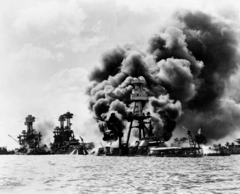 This is also referred to as Pearl Harbor Remembrance Day or Pearl Harbor Day, is observed annually in the United States on December 7, to remember and honor the 2,403 United States citizens who were killed in the Japanese surprise attack on Pearl Harbor in Hawaii on December 7, 1941, which led to the United States declaring war on Japan the next day and thus entering World War II.
This is also referred to as Pearl Harbor Remembrance Day or Pearl Harbor Day, is observed annually in the United States on December 7, to remember and honor the 2,403 United States citizens who were killed in the Japanese surprise attack on Pearl Harbor in Hawaii on December 7, 1941, which led to the United States declaring war on Japan the next day and thus entering World War II.
In 1994, the United States Congress, by Pub.L. 103–308, 108 Stat. 1169, designated December 7 of each year as National Pearl Harbor Remembrance Day. The joint resolution was signed by President Bill Clinton on August 23, 1994. It became 36 U.S.C. § 129 (Patriotic and National Observances and Ceremonies) of the United States Code.[2] On Nov.29, Clinton issued a proclamation declaring Dec. 7, 1994, the first National Pearl Harbor Remembrance Day.
Publisher’s Note – Pennsylvania Governor Declares Masks Must Be Worn In YOUR Own Home If You Have Guests –
Are you kidding me? Pearl Harbor Day is December 7th. Have all of our veterans fought and died to see this type of government coming to our nation and the world?
No!
The list of these mandates just keeps growing. It’s time to stop these predatory decisions by our politicians.
On Pearl Harbor Day, the American flag should be flown at half-staff until sunset to honor those who died as a result of the attack on U.S. military forces in Hawaii. Pearl Harbor Day is not a federal holiday – government offices, schools, and businesses do not close. Some organizations may hold special events in memory of those killed or injured at Pearl Harbor.
Late November Or December, Hanukkah
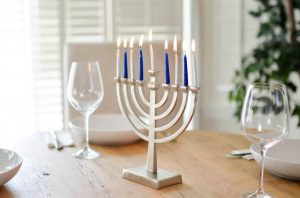 Also spelled Chanukah or Hanukah, this is a Jewish festival commemorating the rededication of the Second Temple in Jerusalem at the time of the Maccabean Revolt against the Seleucid Empire. It is also known as the Festival of Lights.
Also spelled Chanukah or Hanukah, this is a Jewish festival commemorating the rededication of the Second Temple in Jerusalem at the time of the Maccabean Revolt against the Seleucid Empire. It is also known as the Festival of Lights.
Hanukkah is observed for eight nights and days, starting on the 25th day of Kislev according to the Hebrew calendar, which may occur at any time from late November to late December in the Gregorian calendar. The festival is observed by lighting the candles of a candelabrum with nine branches, called a menorah (or hanukkiah).
One branch is typically placed above or below the others and its candle is used to light the other eight candles. This unique candle is called the shamash . Each night, one additional candle is lit by the shamash until all eight candles are lit together on the final night of the festival.
Dec. 21 or 22, Winter Begins
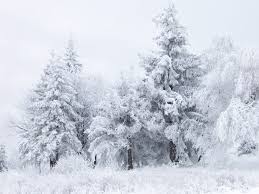 The winter solstice occurs during the hemisphere’s winter. In the Northern Hemisphere, this is the December solstice (usually 21 or 22 December) and in the Southern Hemisphere, this is the June solstice (usually 20 or 21 June).
The winter solstice occurs during the hemisphere’s winter. In the Northern Hemisphere, this is the December solstice (usually 21 or 22 December) and in the Southern Hemisphere, this is the June solstice (usually 20 or 21 June).
Dec. 25, Christmas
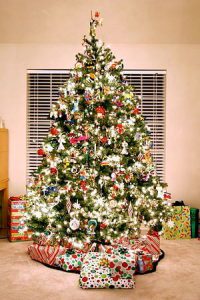 Christmas (which means “Feast day of Christ”) is a Christian holiday that refers to the birth of Jesus (whom Christians believe is the Son of God), and a cultural holiday for non-Christians.
Christmas (which means “Feast day of Christ”) is a Christian holiday that refers to the birth of Jesus (whom Christians believe is the Son of God), and a cultural holiday for non-Christians.
The day known as Christmas Day is celebrated on the 25th day of December. It is one of the most important days of the year for Christians, along with Easter when the death and resurrection of Jesus are celebrated. The season of preparing for Christmas is called Advent and begins on a Sunday about four weeks before Christmas. The Christmas Season (called Christmastide) ends 6 January or the Twelfth Day of Christmas, in which Epiphany is remembered.
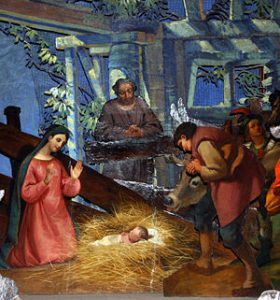
Christmas is celebrated all over the world, as a religious holiday or as a time of celebration by Christians and non-Christians alike. The traditions are different from country to country, but they nearly always include a feast, giving gifts or cards, and enjoying church or public festivities such as singing Christmas carols and songs. Santa Claus is a tradition in many countries of the world.
Christmastide, as it is often called, is in the winter of the Northern Hemisphere, at a time when there were already ancient festivals. Some of the traditions that are used for Christmas are older than Christmas, or come from other non-Christian traditions such as Yule. Modern traditions of Christmas often focus on the giving of gifts. The season for retail stores to sell gifts, food, greeting cards, Christmas trees, and decorations begins the day about a month before Christmas Day.
Dec. 26, Boxing Day
 Boxing Day is a holiday celebrated the day after Christmas Day, thus being the second day of Christmastide. It originated in the United Kingdom and is celebrated in a number of countries that previously formed part of the British Empire. Boxing Day is on 26 December, although the attached bank holiday or public holiday may take place either on that day or one or two days later.
Boxing Day is a holiday celebrated the day after Christmas Day, thus being the second day of Christmastide. It originated in the United Kingdom and is celebrated in a number of countries that previously formed part of the British Empire. Boxing Day is on 26 December, although the attached bank holiday or public holiday may take place either on that day or one or two days later.
The European tradition of giving money and other gifts to those in need, or in service positions, has been dated to the Middle Ages, but the exact origin is unknown. It is sometimes believed to be in reference to the Alms Box placed in the narthex of Christian churches to collect donations to the poor.
Jan. 1, 2021,New Year’s Day,
Also simply called New Year, it is observed on 1 January, the first day of the year on the modern Gregorian calendar as well as the Julian calendar.

In pre-Christian Rome under the Julian calendar, the day was dedicated to Janus, god of gateways and beginnings, for whom January is also named. As a date in the Gregorian calendar of Christendom, New Year’s Day liturgically marked the Feast of the Naming and Circumcision of Jesus, which is still observed as such in the Anglican Church and Lutheran Church. The Roman Catholic Church celebrates on this day the Solemnity of Mary, Mother of God.
In present day, with most countries now using the Gregorian calendar as their de facto calendar, New Year’s Day is among the most celebrated public holidays in the world, often observed with fireworks at the stroke of midnight as the new year starts in each time zone. Other global New Year’s Day traditions include making New Year’s resolutions and calling one’s friends and family.































